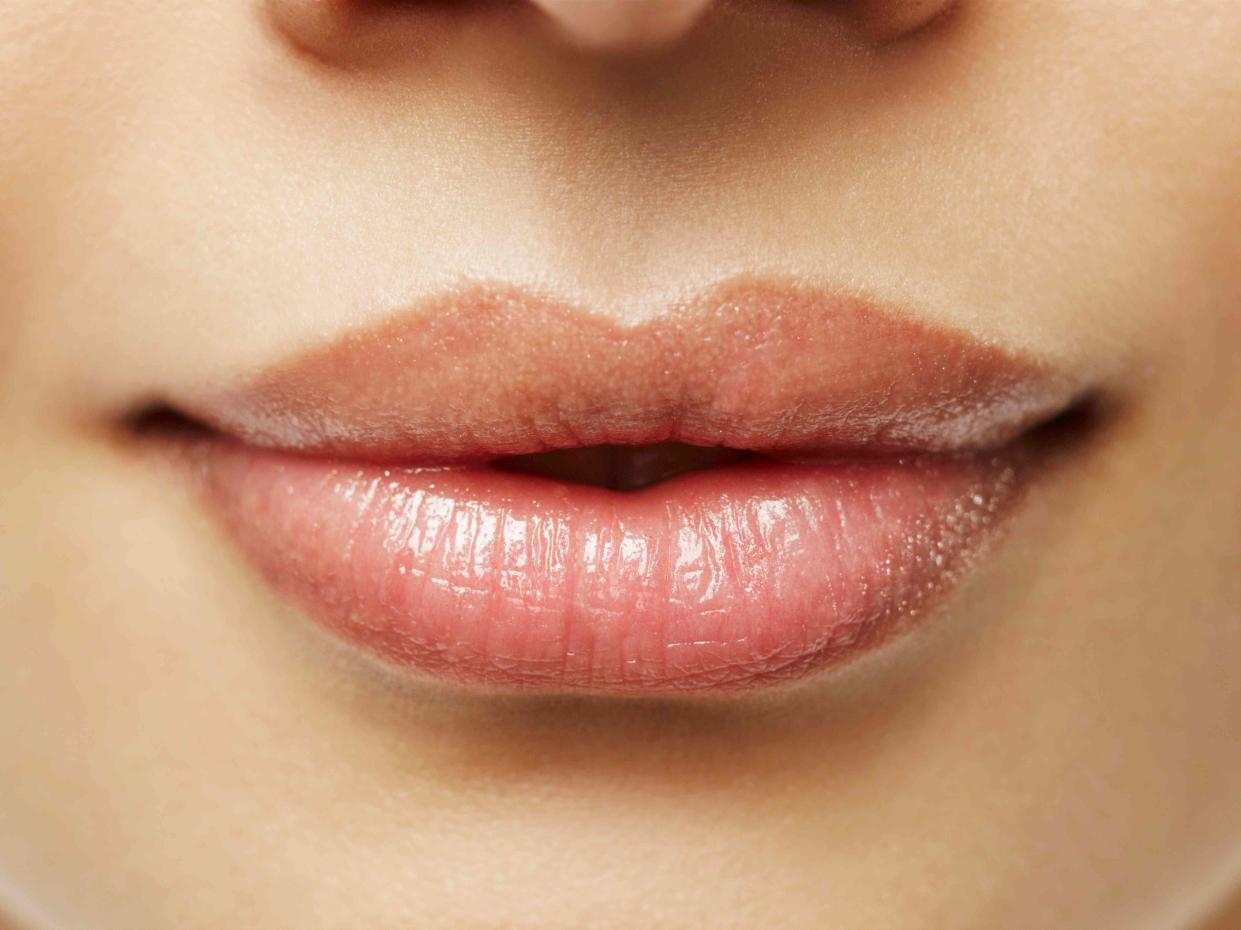How to Tell the Difference Between a Cold Sore and a Pimple

Getty Images
If you’ve ever woken up with a pimple on your lip, you probably felt both irritated and alarmed. Plus, it was likely quite painful. And not knowing whether it’s a pimple or a cold sore, can add to your level of stress. With the lack of information online about the difference between a cold sore and pimple — how do you know?
Acne-prone skin or not, at one time in your life you've woken up with a pesky pimple somewhere on your face. But with the sensitivity of the lip line area, these bumps are often painful, often leaving many to question if it is indeed a pimple or actually a cold sore.
Keep scrolling for our dermatologist led guide on how to tell the difference between a pimple and a cold sore, the best ways to treat each, and common misconceptions, so you can press pause on your anxiety and get to a solution.
Related:How to Get Rid of Cold Sores Quickly, According to Doctors
What is a pimple?
Pimples are a common skin condition with many different types, from whiteheads and blackheads to cysts and pustules. They are small growths on the surface of skin, typically appearing on your face, chest, shoulders, and back. “A pimple is formed from a clogged pore resulting in inflammation,” explains Chris Tomassian, MD, a board-certified dermatologist and founder of The Dermatology Collective.
What is a cold sore?
Cold sores, often called fever blisters, are a common viral infection. A cold sore appears as a collection of small blisters that form on top of a painful red base. “Cold sores are caused by Human Simplex Virus (HSV),” says Dr. Tomassian. “Much of the population is infected with this virus and it stays dormant. Reactivation occurs during episodes of stress, like a sickness, acute stress, or anything that can decrease your immune system.”
Dermatologist Cristina Psomadakis, MD, adds the medical name for a cold sore is herpes labialis, and once you are infected this virus lives in you for life dormant. Plus, it will rear its head in times of stress, illness, and can even be triggered by sunlight.
“It tends to affect the outer part of the lip, but can affect any area around and inside the mouth," she says. "With a cold sore, you may have additional symptoms of feeling unwell with a fever or swollen neck glands. You usually will get a tingling or burning feeling before it comes on, unlike a pimple, and you may have had cold sores in the past.”
How to treat pimples near your lips:
Picking a pimple is cardinal sin, but popping a pimple on the lip line is a big no. Dr. Psomadakis says, avoid the temptation to squeeze it. The lip is so sensitive and can be easily traumatized.
“If you get a pimple try applying a warm compress to help bring the pimple to a head. A pimple sticker or spot treatment can also help — like the Zitsticka patches or the INKEY LIST spot treatment with succinic and salicylic acid),” she says.
If you are getting pimples repeatedly, Dr. Psomadakis recommends reviewing your products to see if anything you are putting on your lips is clogging the pores there or consider whether you are touching or resting your face in a way that leaves you prone to pimples.
“Preventing pimples on the lip line is similar to preventing pimples on the rest of the skin,’ Dr. Tomassian adds. “Use ingredients like retinoids and salicylic acid to help prevent the blockage of the pore and the start of the pimple formation.”
How to treat cold sores:
A cold sore is made up of a collection of tiny fluid filled blisters called vesicles and although it can look white, it is not made up of pus, unlike a pimple, and cannot be popped. “Most cold sores will crust and go away on their own within a week to ten days, and treatment is not needed unless this is a repeated or severe problem,” says Dr. Psomadakis. “A pharmacy can provide zinc or anti-viral creams that may speed up healing time if used very early in the process. You can also get creams that help ease pain or you can use a cold sore patch. For severe cases a doctor can prescribe anti-viral tablet medication.”
Dr. Tomassian agrees that it is best to start treatment at the first sign of a cold sore to prevent formation or quickly resolve the cold sore. “Because cold sores are caused by a virus, the best course of treatment is anti-viral medications such as valacyclovir."
Related:This Is the Only Pimple Patch I've Found That Doesn't Dry Out My Sensitive Skin
Final takeaways:
Pimples and cold sores are very different – pimples are caused by bacteria on the skin – cold sores are caused by HSV, are incurable, and contagious. While a pimple on your lip line will usually appear as whitehead, or blackhead, cold sores are a collection of small blisters on an inflamed red base. There are treatment options for cold sores that can help with pain and their appearance if applied early enough.
Still unsure whether the bump on your lip is a pimple or a cold sore? Speak to your physician. They will be able to analyze it, and if you do have HSV, a blood test will be able to detect it.
For more InStyle news, make sure to sign up for our newsletter!
Read the original article on InStyle.

